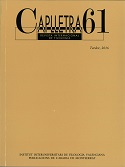The components of the passive. A diachronic perspective
DOI:
https://doi.org/10.7203/caplletra.60.8458Keywords:
passive sentences, diachronic syntax, aspect, functional categories, lexical structure Abstract
Abstract
Abstract: In this paper we argue that «passive sentence» is a cover term with no empirical import or explanatory interest, an epiphenomenon. The properties of passives are derived from the interaction of the formal properties of the functional categories involved. This strictly compositional and constructionist view allows us to gain explanatory adequacy compared to previous approaches based on the properties of individual predicates. Our leading idea is that Romance passives are in fact participial absolute constructions with a light verb (ésser or estar) merged into the structure to license its temporal and discourse features. Specifically, two layers are relevant in passive sentences: a lower area headed by an Aspect projection and a higher one in the T-C system. We tentatively explore the possibility that phase theory could account for these facts. Addressing the topic from a diachronic perspective, further support to our view comes from the discussion of the crucial the role of the perfective system and the passivizing morphology of Latin.
Key words: passive sentences, diachronic syntax, aspect, functional categories, lexical structure.
 Downloads
Downloads
Downloads
Published
How to Cite
-
Abstract684
-
PDF (Català)584
Issue
Section
License
Authors submitting work to Caplletra for publication must be the legitimate holder of the usage rights. Legitimacy for the purposes of publishing the work must also include images, tables, diagrams and any other materials that may complement the text, whether they are the author of such material or not.
Copyright: on publishing their work in the journal, the author grants Caplletra. Revista Internacional de Filologia usage rights (reproduction, distribution and public communication) for both the paper printed version and for the electronic version.
All work published in Caplletra is covered by the Creative Commons license type Attribution-NonCommercial-NoDerivatives 4.0 (CC BY-NC-ND 4.0).
RESPONSABILITY
Caplletra. Revista Internacional de Filologia does not necessarily identify with the points of view expressed in the papers it publishes.
Caplletra. Revista Internacional de Filologia accepts no responsibility whatsoever for any eventual infringement of intellectual property rights on the part of authors.






